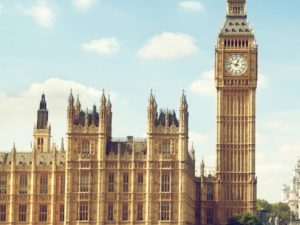 Our policy lead, Madeleine debates the energy policies in the 2019 manifestos
Our policy lead, Madeleine debates the energy policies in the 2019 manifestos
 If we needed reassurance that the climate emergency is firmly rooted in political priorities, this election should give it in spades. The manifestos of all major parties include the phrase climate emergency and they have taken part in leaders’ debate specifically on climate change (with the exception of the Conservatives). The SNP’s manifesto is perhaps not as ambitious as others, but it is based in reality, following years of Scotland leading the UK in their climate policies. The SNP policies could be a crucial factor if coalition discussions take place in the case of a hung parliament – including some of their ongoing policies not outlined in the manifesto, such as the Just Transition Commission, which the Liberal Democrats seemed to suggest could be emulated in the UK, at our recent Renewable Futures conference.
If we needed reassurance that the climate emergency is firmly rooted in political priorities, this election should give it in spades. The manifestos of all major parties include the phrase climate emergency and they have taken part in leaders’ debate specifically on climate change (with the exception of the Conservatives). The SNP’s manifesto is perhaps not as ambitious as others, but it is based in reality, following years of Scotland leading the UK in their climate policies. The SNP policies could be a crucial factor if coalition discussions take place in the case of a hung parliament – including some of their ongoing policies not outlined in the manifesto, such as the Just Transition Commission, which the Liberal Democrats seemed to suggest could be emulated in the UK, at our recent Renewable Futures conference.
Net zero targets
The manifestos compete somewhat on the date to achieve net zero; the Greens with an ambitious 2030, Lib Dems looking to 2045, the SNP staying consistent with their 2045 target already in place, and the Conservatives sticking with 2050. Labour seem to have backed away from naming a date, instead splitting the target into a net zero energy system ‘within the 2030s’ and net zero food production by 2040. Most also aim for a date for zero carbon electricity, with varying routes for achieving that. Again, Greens are the most ambitious with 100% renewable by 2030, with the Conservatives not providing any estimate. The aims for generation don’t raise any surprises – most parties advocate a broad range of technologies, with LD, Greens, Labour and SNP looking to boost solar and onshore wind, but the Tories sticking with offshore wind as we would expect. All parties except the Conservatives are keen to boost marine energy. Interestingly, Labour have plumped for ‘new nuclear power needed for energy security’, in contrast to their recent, comprehensive report ‘Thirty by 2030’, which assumes that the 90% renewable target can be met by 2030 without any new nuclear.
Heat and energy efficiency
Decarbonisation of heat through new technologies and increased energy efficiency has arguably been given more attention than in any previous political strategy and this is reflective of the industry’s consistent message that this is one of our biggest challenges over the next decade. There isn’t really a consistent route to achieve this, which is understandable, as there is little industry agreement on the best route forward at this stage. However, if we are to make the significant progress necessary on decarbonising heat, clear leadership from government is needed on an immediate and ambitious plan.
Points of interest
- The just transition concept is also more prevalent in the manifestos than it has been before – Labour, LDs, Greens and SNP all recognise the necessity for transitioning fairly and equitably to a net zero carbon society. It’s positive to see this being properly addressed and concepts like the Green New Deal, which has a just transition at its heart, have influenced both the Green and Labour manifestos.
- The nationalisation of energy network and supply companies is still a flagship policy for Labour – something we’ve been addressing recently in our Energy Networks for the Future paper.
- Most parties want to ban fracking, with the exception of the Tories who have of course just announced their ‘moratorium’.
- Taxation and ending subsidies for fossil fuels is featured in Labour, LD, Green and SNP manifestos.
- The SNP, with the benefit of being the part in power, have put some very specific policies on energy in their manifesto, calling out Ofgem on the transmission charging regime, suggesting amending the CfD regime to bring back onshore wind and solar, and targeting the change to VAT rules for solar. Their proposal for an accessible database on all customers who haven’t switched suppliers may raise some eyebrows.
Thirty by 2030
Labour have set out some broad upfront targets in their manifesto, but refer to a larger document, Thirty by 2030, which sets out very detailed policy goals and evidence on transforming the energy system, particularly how to delivery decarbonisation of heat. Not all policy recommendations from this report have been taken forward in the manifesto, so cannot safely be relied on as official Labour policy, but it is an interesting read and a very comprehensive plan for decarbonising the energy system – more so than I’ve ever seen a political party produce.
Links to manifestos
Conservative
Green Party
Labour
Liberal Democrats
SNP
